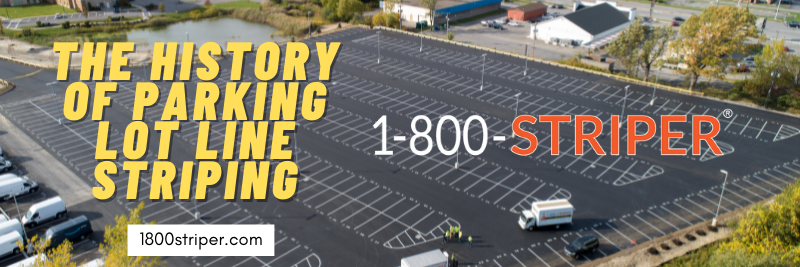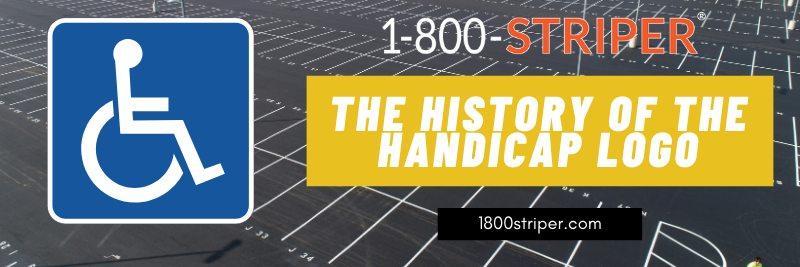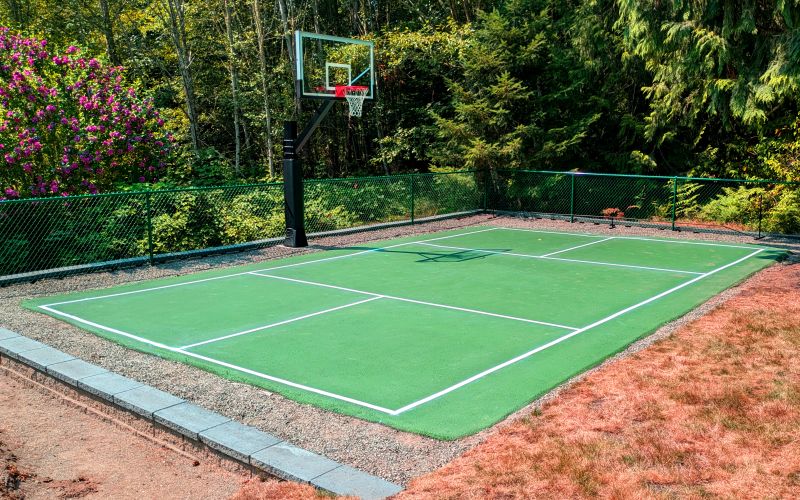If you’re asking “What paint should I use for a parking lot?” or “What are the different types of traffic paint?”, you’ve landed in the right spot. At 1-800-Striper of Providence, we help property managers, contractors, and business owners across Rhode Island choose the right paint for safe, durable, and professional-looking pavement markings.
This guide breaks down four main types of traffic paint and explains when to use each one.
What Is Traffic Paint?
Traffic paint is a special coating used to mark lines, symbols, and signage on roads, parking lots, sports courts, and other paved surfaces. It must stand up to constant wear, exposure to the elements, and automotive fluids like oil and gasoline.
There is no one-size-fits-all solution. The best type of traffic paint depends on the surface, usage, weather conditions, and budget.
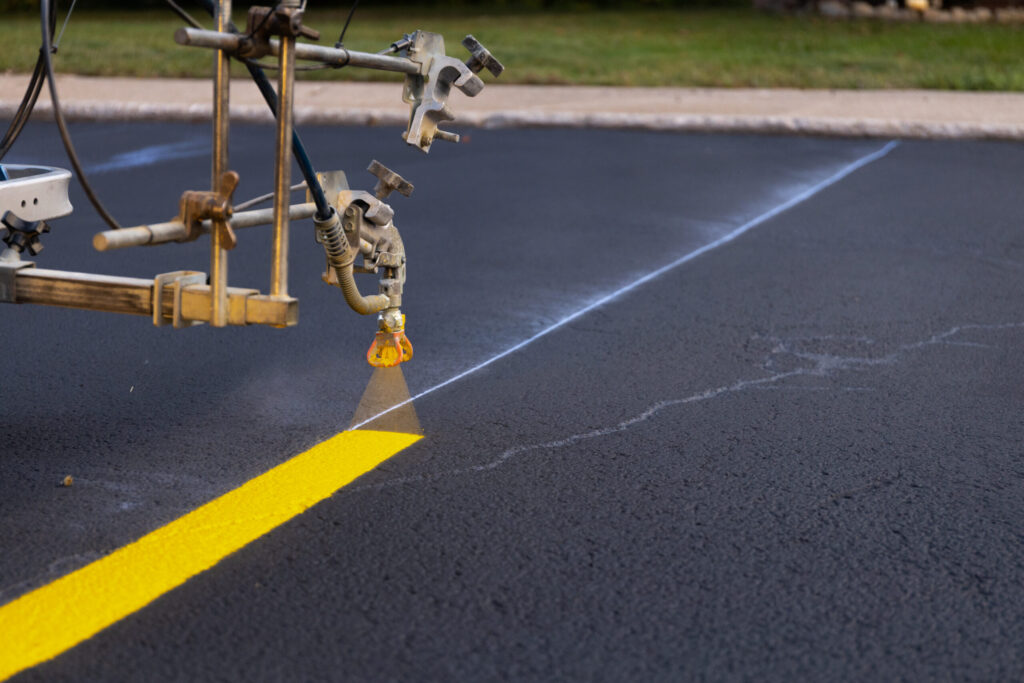
1. Latex Traffic Paint (Water-Based)
What is latex traffic paint?
Latex traffic paint is a water-based solution commonly used for parking lot striping, crosswalks, and bike lanes. It dries quickly, is easy to apply, and works well in moderate weather.
When to use latex traffic paint:
Fresh asphalt or concrete: Latex is less likely to damage or stain new pavement.
Low to medium traffic areas: It’s great for commercial lots and private roads.
Fast-drying projects: It typically dries in under 30 minutes.
Environmentally conscious sites: Water-based paints produce fewer harmful fumes.
Pros of latex traffic paint:
Quick drying time
Easy cleanup with water
Lower VOC emissions
Cost-effective for short-term use
Cons of latex traffic paint:
Less durable in high-traffic areas
May wear down faster under heavy snowplow use
Can be weather-sensitive during application
Latex paint is a great all-purpose choice for quick, budget-friendly striping on low-traffic surfaces.
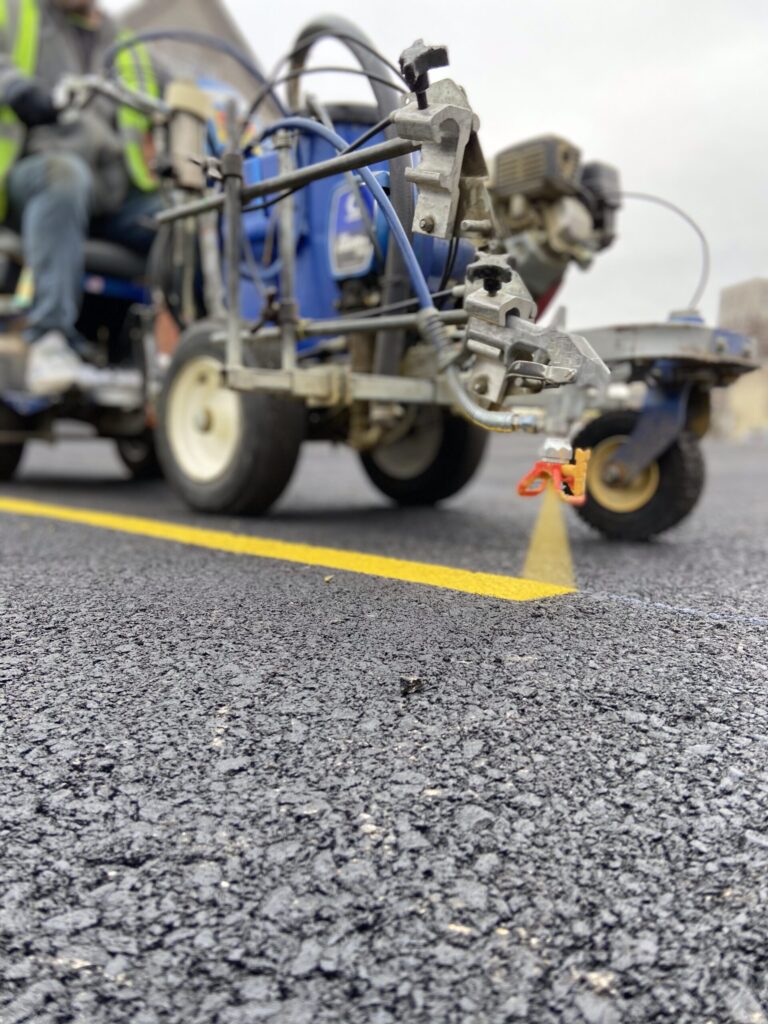
2. Solvent-Based Traffic Paint
What is solvent-based traffic paint?
Solvent-based traffic paint is a more durable option designed for heavier traffic and longer lifespan. It contains strong solvents that allow it to bond well with pavement.
When to use solvent-based traffic paint:
High-traffic parking lots
Roads and intersections
Cooler or humid environments where latex may struggle
Long-term striping solutions
Pros of solvent-based traffic paint:
Longer-lasting than latex
Excellent adhesion to asphalt
Performs better in varying weather conditions
- Very fast drying times
Cons of solvent-based traffic paint:
Requires mineral spirits for cleanup
Higher VOC emissions
More hazardous to handle
Choose solvent-based paint when you need extra durability and aren’t under pressure to complete the job quickly.
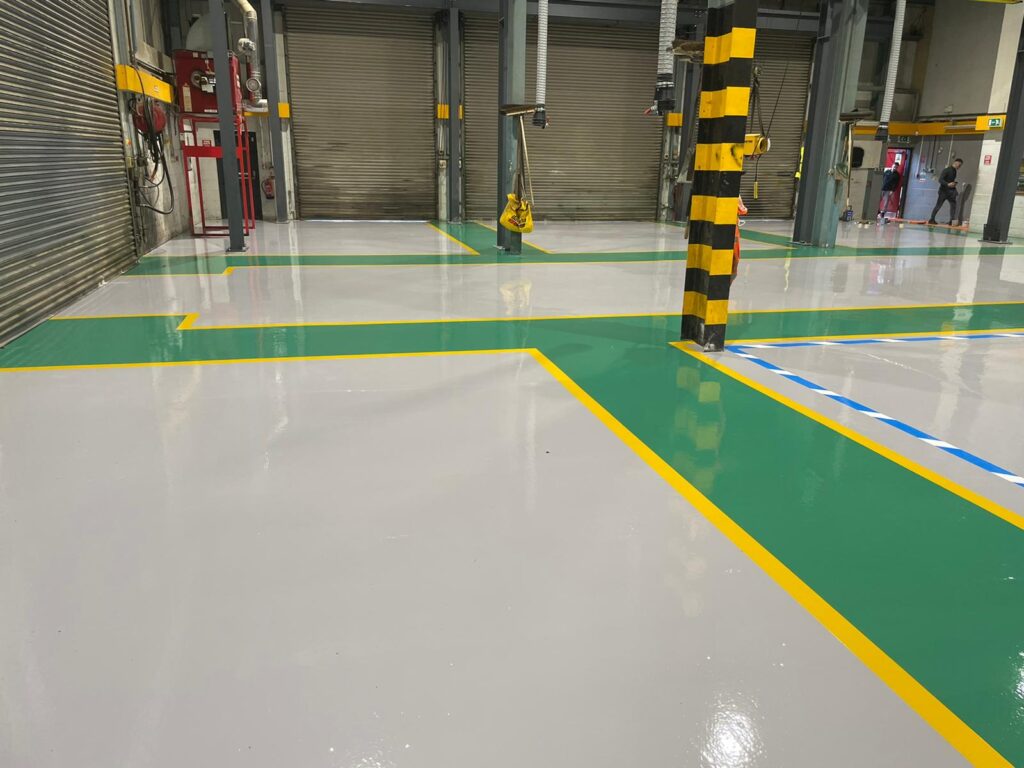
3. Epoxy Traffic Paint
What is epoxy traffic paint?
Epoxy traffic paint is a two-part system that combines resin with a hardener. Once applied, it cures into a tough, chemical-resistant coating that’s ideal for industrial use and heavy-duty environments.
When to use epoxy traffic paint:
Airports, warehouses, or loading docks
Areas with oil or chemical exposure
Industrial-grade applications
Surfaces requiring high visibility and longevity
Pros of epoxy traffic paint:
Extremely durable and long-lasting
Resistant to oil, salt, and chemicals
High reflectivity and visibility
Excellent bond to concrete and asphalt
Cons of epoxy traffic paint:
Higher upfront cost
Requires skilled application
Longer curing time
Not ideal for quick projects
Epoxy is the top-tier choice for longevity and strength, particularly where safety and durability matter most.
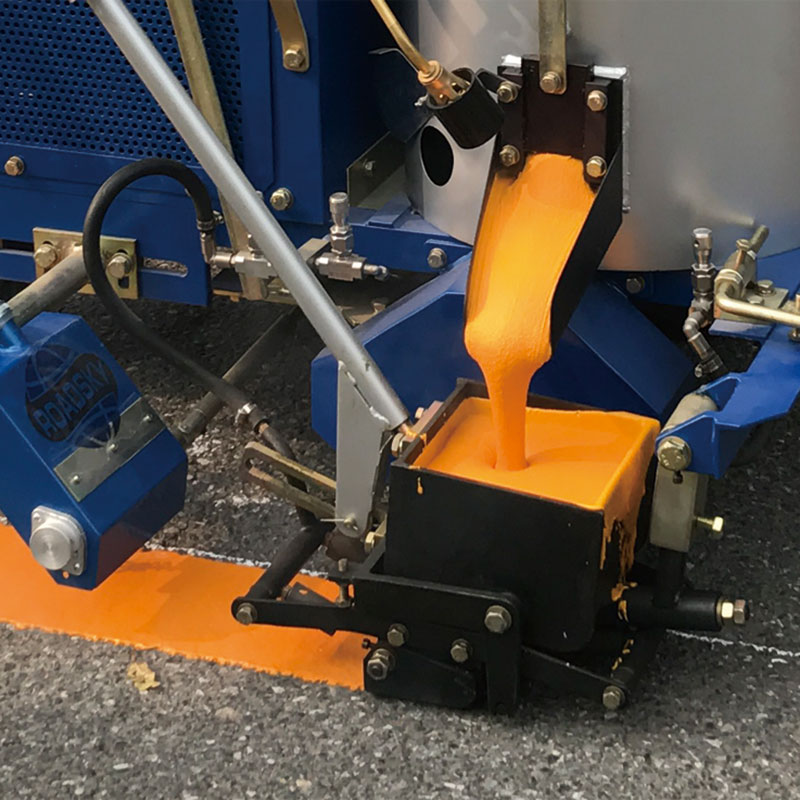
4. Thermoplastic Road Marking
What is thermoplastic paint?
Thermoplastic road marking is not technically a “paint” but a melted plastic compound applied at high temperatures. It forms a thick, reflective layer that adheres tightly to the pavement once cooled.
When to use thermoplastic road markings:
High-traffic roads and highways
Crosswalks and stop lines
Areas needing superior visibility
Public roads requiring regulatory compliance
Pros of thermoplastic markings:
Longest lifespan of all types
High visibility, even at night
Skid-resistant finish
Resistant to fading, chipping, and chemicals
Cons of thermoplastic markings:
Requires specialized equipment
Higher cost
Not suitable for temporary markings
Thermoplastic is the best choice for municipalities and busy traffic zones. It offers unmatched durability and visibility.
Comparison Table: Types of Traffic Paint
| Paint Type | Dry Time | Durability | VOCs | Best For |
|---|---|---|---|---|
| Latex | <30 mins | Moderate | Low | Low-traffic lots, new pavement |
| Solvent-Based | <15 mins | High | High | Roads, high-traffic areas |
| Epoxy | 6-12 hrs | Very High | Moderate | Industrial zones, warehouses |
| Thermoplastic | Immediate after cooling | Extremely High | Low to Moderate | Roads, highways, permanent markings |
Frequently Asked Questions (FAQ)
What type of paint is best for a parking lot?
For most parking lots, latex traffic paint is the most affordable and easiest option. For lots with high traffic or exposure to the elements, solvent-based or epoxy paints may be better choices. For long-term solutions, thermoplastic markings offer the best durability.
How long does parking lot paint last?
Latex: 1–2 years
Solvent-Based: 2–3 years
Epoxy: 3–5 years
Thermoplastic: 5–8 years
Lifespan depends on traffic, weather, and maintenance.
Can I paint over old parking lot lines?
Yes, but the old lines must be clean, dry, and free of peeling paint.
Professional Parking Lot Painting in Rhode Island
At 1-800-Striper of Providence, we specialize in professional parking lot painting services across Rhode Island. Whether you’re marking a new parking lot or refreshing faded lines, we use the right materials for the job.
Our team helps you choose the perfect traffic paint based on:
Budget
Surface material
Traffic volume
Weather conditions
Why Choose 1-800-Striper of Providence?
25 years of parking lot painting expertise
Fast, professional service
ADA-accessible layouts
We only use the highest quality paint from Sherwin Williams
Let us take the guesswork out of pavement markings. We’ve helped hundreds of local businesses keep their lots safe, clear, and compliant.
Need Help Choosing Traffic Paint? Contact Us Today!
If you’re still wondering what kind of paint to use on your parking lot, give us a call. Our team at 1-800-Striper of Providence is here to guide you every step of the way.
Call us today or request a quote online to get expert advice and fast, professional service!

